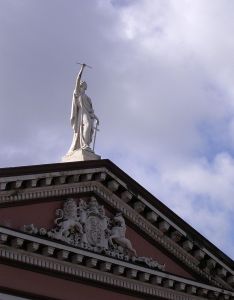Warger v. Shauers , an appeal heard before United States Supreme Court, involved plaintiff who was riding his motorcycle on a highway when a truck defendant was driving hit plaintiff from behind. Plaintiff claimed he was stopped at the time of the motor vehicle crash, while defendant claimed plaintiff unexpectedly pulled out in from of him, causing the crash.
 What is not in dispute is the auto accident resulted serious personal injury, and plaintiff was eventually required to have his left leg amputated. Plaintiff originally sued defendant for negligence in federal court. During jury selection, both parties had an opportunity for lengthy voir dire of prospective jurors.
What is not in dispute is the auto accident resulted serious personal injury, and plaintiff was eventually required to have his left leg amputated. Plaintiff originally sued defendant for negligence in federal court. During jury selection, both parties had an opportunity for lengthy voir dire of prospective jurors.
As our motor vehicle accident lawyers in Boston can explain, voir dire is a legal term that literally translates to “speak the truth.” It is the process whereby attorneys can ask questions of potential jurors to determine how they feel about certain issues relevant to the case.
Plaintiff’s attorney asked prospective jurors whether they would be unable to award money for pain and suffering or for future medical expenses, or if any prospective juror did not think he or she could be a fair and impartial juror in the case. The juror who later became foreperson answered no to each question.
At trial, the jurors found in favor of defendant. After trial, one of the jurors contacted plaintiff’s attorney and expressed concern over foreperson’s conduct during trial. This juror signed an affidavit saying foreperson had spoken during deliberations about an accident in which her daughter was at-fault for the crash and a man died. She also said if her daughter had been sued, it would have ruined her life.
Plaintiff’s counsel moved for a new trial and claimed foreperson had intentionally lied during voir dire and was biased during deliberations. Plaintiff cited a rule saying he was entitled to a new trial if a showing can be made that a juror failed answer honestly during voir dire.
The court denied the motion on grounds that the only evidence to support his claim was barred by Federal Rule of Evidence 606(b). This rule provides during an inquiry into validity of a verdict, evidence about any statement made during deliberations is inadmissible. There are several exceptions to this rule, but trial court did not contend they applied to this situation.
On appeal, the United States Court of Appeals for the Eighth Circuit, and, later, the United States Supreme Court, affirmed trial court’s denial of the motion for a new trial. The question was not one of whether the juror had lied during deliberations but rather how the parties learned such fact.
Congress created a rule that made statements during deliberations inadmissible. The main reason for this was out of a desire to facilitate free and open discussions during jury deliberations, so jurors are not afraid to express their opinions.
While many cases settle prior to trial, jury selection is an important issue should a trial become necessary. You should speak with your car accident lawyer about how this process will work in your case.
If you are injured in an accident in Massachusetts, call Jeffrey Glassman Injury Lawyers for a free and confidential appointment — (617) 777-7777.
More Blog Entries
Floyd-Tunnell v. Shelter Mut. Ins. Co. Uninsured Motorist Coverage and Stacking, July 3, 2014, Boston Car Accident Lawyer Blog
 Boston Car Accident Lawyer Blog
Boston Car Accident Lawyer Blog

